We use cookies to make your experience better. To comply with the new e-Privacy directive, we need to ask for your consent to set the cookies. Learn more.
Evaluating Books: What Would Thomas Jefferson Think About This?
Subtitled "What would Thomas Jefferson think of this?" Provides guidelines for selecting books consistent with the principles of America's founding fathers. Richard Maybury, known as "Uncle Eric" in Whatever Happened to Penny Candy and Whatever Happened to Justice, hits the mark again! This book helps home educators and older students make informed choices about which books to select by showing us how to identify the philosophical slant of the author. Cathy Duffy calls it "a perfect follow-up for [the other two books]. More than a 'book guide,' it teaches basic principles of economics and government in bite-size nuggets - with examples." Includes a recommended list of approved authors and three articles that tell the "other side" of American history - the one not generally told in school textbooks. A wonderful resource for homeschoolers or any lover of American history. Though the book contains several reading recommendations for children as young as ten, the bulk of the reading is recommended for the middle-school to high-school level. 127 pgs, pb.
Evaluating Books: What Would Thomas Jefferson Think About This by Richard J. Maybury is a collection of guidelines for selecting books (and other media) consistent with the principles of America's Founders.
Evaluating Books teaches principles of economics and government in bite-sized nuggets, and gives indicators for spotting the philosophical slant of most writers and media commentators on the subjects of law, history, economics and literature.
Using the epistolary style of writing (using letters to tell a story), Mr. Maybury plays the part of an economist (Uncle Eric) writing a series of letters to his niece or nephew (Chris). Using stories and examples, Mr. Maybury gives interesting and clear explanations of topics that are generally thought to be too difficult for anyone but experts.
Mr. Maybury warns, "beware of anyone who tells you a topic is above you or better left to experts. Many people are twice as smart as they think they are, but they've been intimidated into believing some topics are above them. You can understand almost anything if it is explained well."
| Product Format: | Softcover Book |
|---|---|
| Brand: | Bluestocking Press |
| Author: | Richard J. Maybury |
| Grade: | AD |
| ISBN: | 9780942617535 |
| Length in Inches: | 8.5 |
| Width in Inches: | 5.5 |
| Height in Inches: | 0.3125 |
| Weight in Pounds: | 0.425 |

